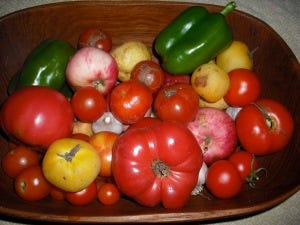Inorganic Food

Ok, yeah, this stuff will kill you.
Chemistry is everywhere. Some of you may know this, but for a long time I lived with my Dad on a small New England farm, where we grew veggies and chickens and dabbled with other things. Most of it was his ideas, I was just grunt labor helping him keep up with chores. Dad's been a fan of intensive, sustainable agriculture since I can remember, and I grew up reading Square Foot Gardening, the Victory Garden, and Mollison's Permaculture. Now, all that is in, and hip. Organic food can be found everywhere, and even though it's three times the price of the other stuff, if you don't buy it, then you are a Bad Person and don't care about your Family.
Only... what if organic food is just a marketing ploy? Dad and I never tried to go for organic certification for the Farm. It simply wasn't worth it to us. Sure, we gardened with no store-bought fertilizers or pesticides, but that doesn't mean we didn't use any at all, and it is the same way with the stuff you find priced through the roof in the store. They have still had fertilizers, and pesticides, and herbicides (to control weeds) applied to them. Only difference is which ones they can use and still meet the federal guidelines. Organic is like buying brand-name, there's no real difference between it and the regular, generic stuff.

non-organic produce, grown by organic principles. Confused yet?
I'm bringing this up because I recently ran across a few articles that are pertinent to this topic, and it reminded me how much of the organic myth is based on marketing, because as you will see, there are very few actual studies that have been conducted with any kind of scientific rigor. Not that it matters to the people who buy organic, they are doing it because it fits their conformational bias, that big commercial anything must be bad. By buying organic they assuage their guilt, even if it's based on half-truths and misinformation. That doesn't matter, as long as they feel better.
The American Journal of Clinical Nutrition: This systematic review of the available published literature was designed to determine the strength of the evidence that nutrition-related health benefits in humans could be attributed to the consumption of organically produced foodstuffs. Taken together, the 12 included articles did not provide evidence of health benefits or harm from consuming organic foods. A surprising and important finding of this review is the extremely limited nature of the evidence base on this subject, both in terms of the number and quality of studies.
I'm not the only one who has these unpopular and slightly cynical thoughts on the massive industry that Organic Food has become. Ross Pomeroy asks, So why are the misconceptions so pervasive? According to an in-depth report by Academics Review, a group founded by University of Illinois nutritional scientist Bruce M. Chassy and University of Melbourne food scientist David Tribe, the organic and natural-products industry -- which is worth an estimated $63 billion worldwide -- has engaged in a "pattern of research-informed and intentionally-deceptive marketing and advocacy related practices with the implied use and approval of the U.S. government endorsed USDA Organic Seal." Like their succulent fruits and scrumptious vegetables that we eat, the organic industry has given consumers a nibble of untruth and a taste of fear, and have allowed misunderstanding to sow and spread while they reap the benefits.
Finally, before I go off to take my statistics exam, I'll leave you with a link to an organic chemist's blog. You know those 'all-natural' recipes you see pop up on Pinterest and FB all the time? Take them with a large grain of salt. Sometimes what you are making is worse for the purposes than those much-belabored çhemical' solutions from the store. Because here's the thing. It's all chemical. From the dihydrogen monoxide you drink, to the sucrose in your caffeine vehicle of choice, elements make up everything that goes in your body. And your body, for that matter. The food at the store that isn't labeled organic? That doesn't make it inorganic because inorganic chemicals aren't edible at all, and we'd die horrible deaths. Only we don't. We still make delicious food, and we can afford more of it, too.



